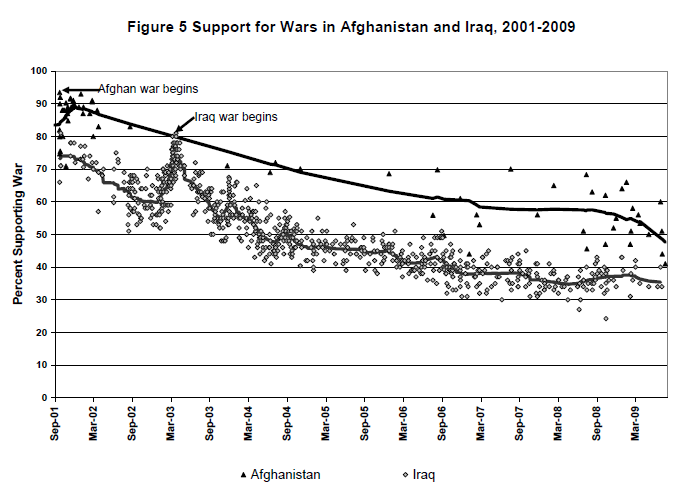Unlike Bush who made regime change in Iraq a goal of the military intervention (calling Saddam an "ally of Al Qaeda", despite lack of evidence in that respect beyond the fact that Iraqi TV and Saddam publicly cheered the 9/11 attackers as bringing some kind of "deserved" retribution upon the US), Obama did not send troops to Syria with the overt mission to depose dictator Assad, although he (and the US more broadly) were largely not opposed to such an outcome.
Instead Obama has acted militarily overwhelmingly against ISIS in Syria. ISIS was perceived as a threat to the West more broadly. Perhaps ISIS is not perceived in the US as dangerous as bin Laden's Al Qaeda group was, at least as far as ISIS focus was more on European targets abroad, but framing/focusing the intervention in Syria as a fight against such a group clearly is going to resonate differently than regime change.
The Bush intervention in Afghanistan, although also leading to regime change there is probably a more apt parallel with what Obama did in Syria. (The Taliban were much more clearly/openly allied with Al Qaeda.) The US public kept seeing the Afghanistan intervention more positively over time:
I can't find a similar/direct poll comparison with Obama's Syria intervention (right now), but hopefully this should give you an idea why the views on the interventions in/against Syria/ISIS and Iraq/Saddam differ.
Actually a 2013 US poll (pre-ISIS poll) on Syria found that
In the United States, 65 percent of those surveyed in a separate tracking poll agreed with a statement that said “the problems of Syria are none of our business.” [...] Similarly, only 29 percent support the Obama administration’s decision to arm anti-government rebels in Syria, while 49 percent oppose that move.
So an Iraq-style [regime change] intervention in Syria was clearly unpopular in the US. On the other hand, just a year later, a US poll on strikes against ISIS found a completely different picture:
A new Washington Post-ABC News poll finds 71 percent of Americans support air strikes against the Sunni insurgents in Iraq, up 17 percentage points from only three weeks ago and up 26 points from mid-June, when the public split evenly on the issue.
Republicans are by far the most supportive of military action, with 83 percent in the Post-ABC poll supporting air strikes in Iraq, up 22 points from mid-August. But support among Democrats and independents has also grown by double digits in recent weeks, and two-thirds of each group now backs air strikes against ISIS. Support for air strikes in Iraq crosses almost every demographic line except the youngest age cohort, where those under age 30 split 44 percent in support and 46 percent in opposition. Clear majorities of men and women, whites and non-whites, and liberals and conservatives support attacking the Islamic State.
And the same poll found a similar enough US public opinion on ISIS and Al Qaeda:
So, what explains the public rapid rallying in support of another Iraq battle led by an unpopular President -- especially when 78 percent approved of withdrawing troops from the country in 2011?
Polls suggest the Islamic State's brutal tactics have hit Americans' terrorism nerve, with the group quickly gaining a reputation as threatening as al Qaeda. In the Post-ABC poll, nine in 10 adults see the Islamic State as a serious threat to U.S. interests, including 59 percent who call it a "very serious" threat. Even before the second of two Americans was reported to be executed, a Pew Research Center survey found 67 percent calling ISIS a "major threat" to U.S. well being, only four points shy of al Qaeda.
